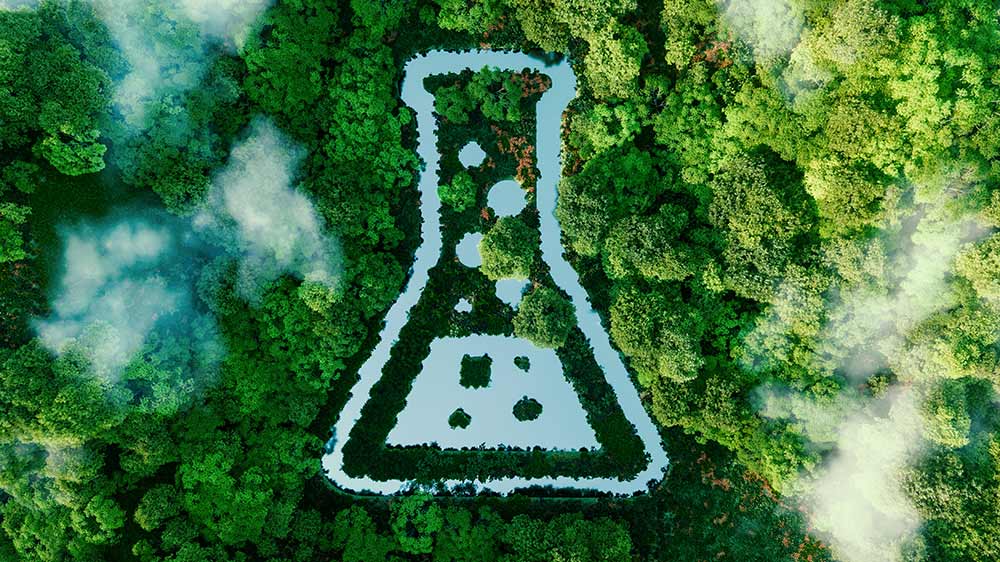Green chemistry is not just a trend, but a crucial approach for the sustainable transformation of the chemical industry. As environmental awareness grows and regulations become stricter, the industry is shifting towards more environmentally friendly, safer, and resource-efficient processes. Central to this shift is the targeted substitution of hazardous chemicals and the introduction of sustainable alternatives. Two outstanding examples of this approach are Lactate (CAS: 79-33-4) and rezykliertes Dimethylterephthalat (r-DMT, CAS: 120-61-6).
Lactates – Efficient, environmentally friendly solvents
Lactates are part of the new generation of solvents that are not only efficient but also safer and more environmentally friendly than many conventional solvents. They are biodegradable, non-toxic, and reduce harmful impacts on human health and the environment compared to traditional solvents such as acetone or chlorinated hydrocarbons. Lactates are increasingly being used in industrial cleaning, paints and coatings, as well as in cosmetics and food applications. The benefits of Lactates are manifold: they offer high solvency power and low toxicity, making them an ideal choice for applications where reducing health risks and environmental impacts is a priority. Additionally, their use significantly improves working conditions as they release fewer hazardous vapors, thus minimizing risks for workers.
r-DMT – A Step Towards a Circular Economy
Another example of sustainable green Chemistry is r-DMT, which is produced through chemical recycling of polyester waste, such as PET bottles or textile residues. This process allows for the conversion of waste into valuable raw materials, which can then be used in the production of new products without any loss of quality. Unlike mechanical recycling, which often degrades the material quality, chemical recycling of r-DMT recovers nearly pure monomers that can be used in the production of new plastics. This circular approach not only reduces the demand for fossil resources but also lowers CO₂ emissions and minimizes the amount of plastic waste sent to landfills. r-DMT is a prime example of the shift from a linear to a circular economy and highlights the potential of Green Chemistry to drive a sustainable future.
The Importance of Substitution in Chemicals
The substitution of hazardous substances is a key component in the transition towards greater sustainability in chemistry. However, this process can be complex and challenging, as technical requirements, regulatory demands, and economic factors must all be considered. The targeted selection of safer alternatives is therefore crucial for the success of this transition.
MCC-Menssing Chemiehandel & Consultants GmbH supports businesses in actively navigating this transition to safer and more sustainable chemicals. We offer comprehensive consulting and practical solutions tailored to the specific needs and requirements of your business. Our focus is on identifying alternative substances, assessing ecological and toxicological aspects, and integrating these new substances into existing production processes.
Resources for Supporting Substitution
There are several resources available to assist companies in implementing substitutions:
- The SUBSPORTAL provides a comprehensive database with information on hazardous chemicals and their alternatives, as well as best practice examples from the industry.
- The ECHA offers extensive support and guidelines for companies dealing with the substitution of hazardous substances.
- The network Chemistry for Sustainability – Safer Alternatives promotes knowledge exchange and experience sharing for the use of safe, sustainable alternatives in the chemical industry.
Green chemistry offers numerous opportunities to make the chemical industry more sustainable.
With substances like Lactates and r-DMT, viable alternatives are already available that are both environmentally and economically beneficial.
Our company helps you successfully implement these alternatives and update your production processes to the latest standards of green Chemistry. We offer tailored solutions that will help you tackle the challenges of substitution and contribute to building a sustainable future.
